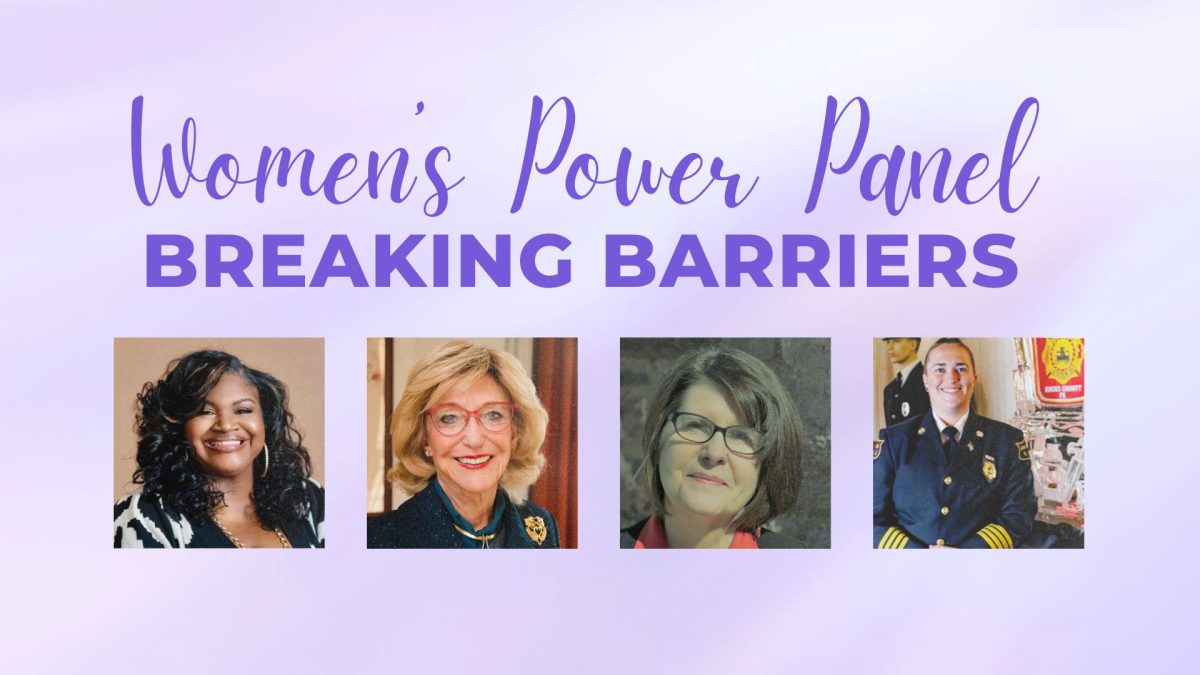To close Women’s History Month, Bucks held a “Women’s power panel: Breaking Barriers” event which featured four significant and unique leaders from the community discussing this year’s national theme, “Women Who Advocate for Equity, Diversity and Inclusion.”
The four women and their stories worked together to describe a collective yet ever-evolving reality for the contemporary woman. Their perspectives culminated in an overarching air of powerful optimism when it comes to women’s societal and professional evolutions.
Moderating the panel was Erica Waller-Hill an award-winning author, professional educator and motivational speaker. Her diverse expertise helped guide the group through complex conversations and anecdotes about existing as professional, barrier-breaking women.
Waller-Hill’s knack for storytelling was immediately evident when she chronicled her experience as a young Olympic hopeful. She encouraged young women to also “tell their stories,” emphasizing the mutually advantageous relationship between audience and speaker.
When Waller-Hill asked the panel what career challenges they faced due to gender, Dr. Vail Garvin presumed that all four of them likely “faced similar issues as we’ve moved up the ladder, but the key is a persistent ‘dreaming,’ on both an individual and collective level, “that things will be better.”
Garvin became the first female CEO of a large hospital during the 1980s, a time when the salaries and treatment of women in male-dominated fields were hugely unequal. She recalls that in 1983, as CEO of a hospital, she made $30,000. When she left, a male replaced her and made $90,000. “Equity in the marketplace,” she says, “has always been a vital issue.”
Barbra Simmons, Executive Director of the Langhorne Borough-based Peace Center for over 30 years, said that a major challenge in her career was that male-dominated groups “constantly tried to prove me wrong, as they weren’t impressed with peacebuilding or mediation,” which are Simmons’ areas of professional expertise.
Then, Waller-Hill asked Simmons if she felt any “suppressed emotions” involved with being in unfair, male-dominated work environments. To which Simmons recalled a meeting in which a male colleague angrily put down his fist and told her to “Stop talking.” She remained composed until she “got in the car and cried all the way home,” recounts Simmons
The difference in the way men and women conduct themselves in the workplace was consistently brought up throughout the panel. Simmons stated that “in many ways, society is out of balance in terms of the masculine and the feminine.”
Panelist Liz Ellis, one of Bucks County’s first female career firefighters and the first female instructional equipment specialist at Bucks’ public training safety center, highlighted this gender dichotomy by stating that “in emergency medicine, how women deal with information is much different than men.” Women offer a type of empathic intelligence that is so obviously necessary in healthcare.
Simmons, being a professional mediator, voiced that she fervently “believes in dialogue.” Similarly, Garvin advises young people to “know the good that empathy does.” The “diversity” that comes from empathy, she said, “is good for business- this combination is what is called ‘innovation.’”
“Support your sisters and other women,” said Simmons, “And don’t go to war with your body,” she quickly added when asked what advice she’d give the upcoming generation.
She also encouraged “young women to think about entering politics,” to which Waller-Hill, Ellis and Garvin all strongly agreed.
Also agreed upon by the four women is the significance of life-long education. Ellis advised the new generation to “constantly keep growing, especially keep learning,” and Garvin calls on young people to “get as much education as you can- you never know what door will open.”


